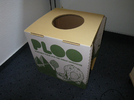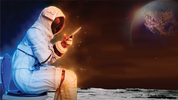- Messages
- 12,453
I found this article last summer if I'm not mistaken, but forgot to post it. Yes, it's pretty funny, poop on the moon, right? But it's pretty interesting when you think about it.
There are many images, like those explaining how astronauts poop in space. They even included a map showing where is the poop on the moon!
Jokes aside, it's a great read.
------------------------------------------------
What 50-year-old dirty diapers can teach us about the potential origins of life on Earth.
It’s been nearly 50 years since the Apollo 11 moon landing. Neil Armstrong’s iconic footprint is still there, undisturbed; there’s no atmosphere, no wind on the moon to blow it away.
But the bigger human footprint on the moon is, arguably, the 96 bags of human waste left behind by the six Apollo missions that landed there.
Yes, our brave astronauts took dumps on their way to the moon, perhaps even on the moon, and they left behind their diapers in baggies, on humanity’s doorstep to the greater cosmos.
The bags have lingered there, and no one knows what has become of them. Now scientists want to go back, and answer a question that has profound implications for our future explorations of Mars: Is anything alive in them?
Human feces can be disgusting, but they’re also teeming with life. Around 50 percent of their mass is made up of bacteria, representing some of the 1,000-plus species of microbes that live in your gut. In a piece of poop lives a whole wondrous ecosystem.
Planet Earth has hosted this life and so much more for upward of 3.9 billion years. The moon, as far as we know, has been sterile and lifeless that whole time.
With the Apollo 11 moon landing, we took microbial life on Earth to the most extreme environment it has ever been in. Which means the human feces — along with bags of urine, food waste, vomit, and other waste in the bags, which also might contain microbial life — on the moon represents a natural, though unintended, experiment.
The question the experiment will answer: How resilient is life in the face of the brutal environment of the moon? And for that matter, if microbes can survive on the moon, can they survive interstellar travel, making them capable of seeding life across the universe, including on places like Mars?
Keep reading:

 www.vox.com
www.vox.com
There are many images, like those explaining how astronauts poop in space. They even included a map showing where is the poop on the moon!
Jokes aside, it's a great read.
------------------------------------------------
What 50-year-old dirty diapers can teach us about the potential origins of life on Earth.
It’s been nearly 50 years since the Apollo 11 moon landing. Neil Armstrong’s iconic footprint is still there, undisturbed; there’s no atmosphere, no wind on the moon to blow it away.
But the bigger human footprint on the moon is, arguably, the 96 bags of human waste left behind by the six Apollo missions that landed there.
Yes, our brave astronauts took dumps on their way to the moon, perhaps even on the moon, and they left behind their diapers in baggies, on humanity’s doorstep to the greater cosmos.
The bags have lingered there, and no one knows what has become of them. Now scientists want to go back, and answer a question that has profound implications for our future explorations of Mars: Is anything alive in them?
Human feces can be disgusting, but they’re also teeming with life. Around 50 percent of their mass is made up of bacteria, representing some of the 1,000-plus species of microbes that live in your gut. In a piece of poop lives a whole wondrous ecosystem.
Planet Earth has hosted this life and so much more for upward of 3.9 billion years. The moon, as far as we know, has been sterile and lifeless that whole time.
With the Apollo 11 moon landing, we took microbial life on Earth to the most extreme environment it has ever been in. Which means the human feces — along with bags of urine, food waste, vomit, and other waste in the bags, which also might contain microbial life — on the moon represents a natural, though unintended, experiment.
The question the experiment will answer: How resilient is life in the face of the brutal environment of the moon? And for that matter, if microbes can survive on the moon, can they survive interstellar travel, making them capable of seeding life across the universe, including on places like Mars?
Keep reading:

Apollo astronauts left their poop on the moon. We gotta go back for that shit.
What 50-year-old dirty diapers can teach us about the potential origins of life on Earth.
 www.vox.com
www.vox.com




